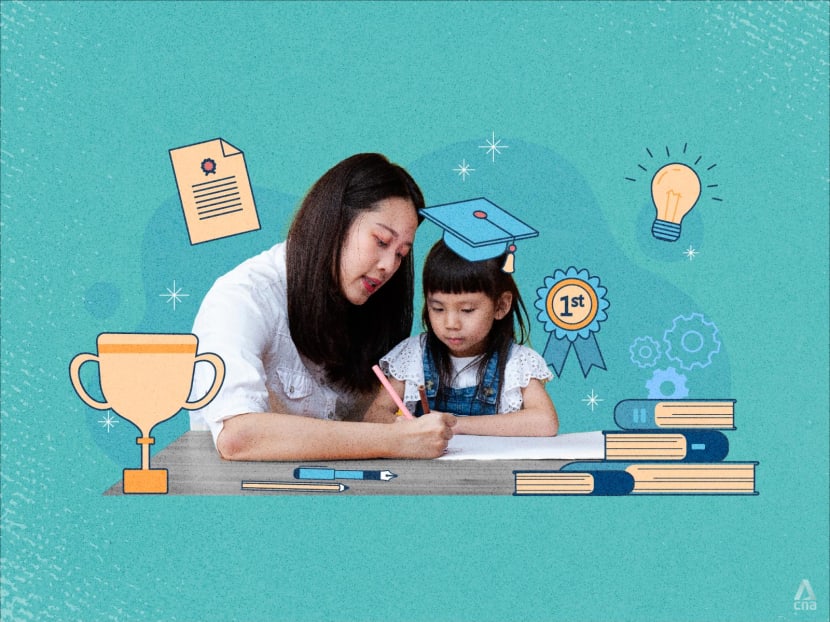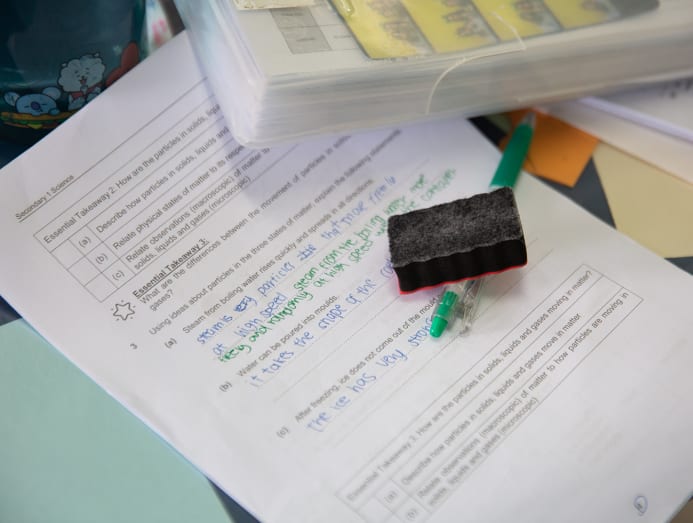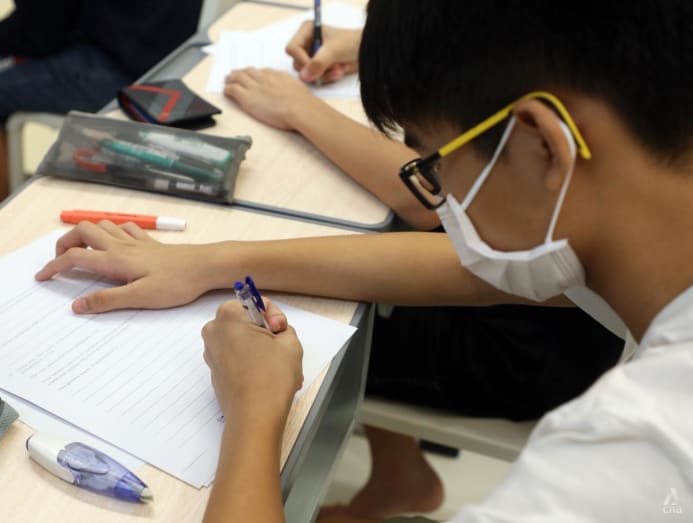Why I'm easing up on pushing my kids to excel in their studies
If we don't pile on the pressure today, are we holding our children back from a 'successful' future? Mum-of-five Kelly Ang says the answer depends very much on how we define success.

(Illustration: CNA/Samuel Woo, iStock)

This audio is generated by an AI tool.
When my sons entered primary school four and two years ago, I told myself I’d be the chillest mum that ever mummed. The progressive mum who would benevolently watch over her children as they studied – or not, if they wished.
My eldest made it to Primary 3 relatively unscathed (read: no tuition), but in his Primary 4 and 5 years, the stress to do well for his exams crept up on us. I’m no tiger mum, but I’m also nowhere near as relaxed as I was a year or two ago.
There’s now a daily routine of nagging, cajoling and eye-rolling.
“Do your homework!”
“Learn the words for your spelling test!”
“Go through the mistakes you made in your last assignment!”
“Did you do the extra practice questions yet?”
There’s also a lot of whining thanks to my newest rule: No video games in the lead-up to examinations.
All things said – yep, I’ve definitely shed the last vestiges of my “chill mum” persona.
THE CASE FOR PUSHING
The dreams of generations past were built on the premise of meritocracy: Stories of ordinary folk working hard in their studies and opening doors to success that would’ve otherwise stayed shut. Modern-day fairytales.
Today, the ideal of meritocracy has taken on a life of its own. Parents who fought and won a “better” life for themselves now pass on their hard-earned advantages to their own children, having the means to enrol them in extracurricular classes or activities that help them stay ahead of the pack.

Singapore has come a long way, but at its core, nothing much seems to have changed from when the parents of today were schoolchildren themselves.
Grades still seem inordinately important – especially at pivotal education milestones like the Primary School Leaving Examination (PSLE), O-Levels and A-Levels, where the results determine the next phase of your education journey and, subsequently, the jobs you land and life you lead.
So if my child has shown that he’s capable of attaining good grades with consistent effort, is it my responsibility as his parent to help and guide him to reach his potential?
If so, what is that responsibility shaped by and where does it end?
THE CASE FOR NOT PUSHING
The stresses of excelling within such a system are also undeniable: Singapore’s children are an extremely stressed-out bunch, with many saying that school is the primary source of their stress.
Calls to redefine definitions of success have resounded of late. Two prominent examples are the Forward SG report in 2023, and Prime Minister Lawrence Wong’s 2024 National Day Rally speech in August.
Some pragmatic naysayers were outspoken: “Of course the government can say this – those in it are already considered elite. For ordinary people, good grades are still important for a better life.”
But I, for one, really like the sound of this.
I’m hoping that this will herald the start of a new era of education – one in which my children face considerably less pressure to attain high grades, because these grades are no longer closely tied to certain “prestigious” jobs.
As my two oldest children sit for their year-end exams this year, I’ve been challenged to put my idealistic beliefs into action.
If I believe that good grades are not the only means to a successful, good life, then I ought not to over-emphasise grades in my parenting.
ON SETTING GOALS – AND FALLING SHORT
Can we reach a middle ground between individual achievement and societal worth?
Surprisingly, I think my personal answer to this question can be found from my own experience as a child.
I was never overly pressured to excel in school. My parents were largely encouraging but not overbearing. Like most other parents, they had quietly hoped that I’d get good grades – but they let me decide how hard I would push myself, and stepped in to help me when I specifically requested it.
Looking back, I’m thankful that I now know first-hand that this approach can work, too.
Twenty years on, I’m doing the same for my children in principle – albeit with a firmer hand, because their personalities differ from mine and they seem to need more guidance than I did.

I help my two oldest kids set exam targets for themselves, realistic goals that match up to their personal abilities.
We work out a study timetable to meet these goals and I take the time to go through their practice papers and classwork with them, carefully reviewing mistakes in great detail.
I also tell them that it’s fine if their results fall short. We can adjust our targets for the next round, work harder or get more help.
This whole exercise teaches my children that they are in control of their own education journey – but I am with them as well. Nagging, coaxing, coaching and all.
We’re right in the middle of exam season as I write this. My boys are fully on board with the revision plan in spirit, but are facing some resistance in getting their bodies to cooperate.
Earlier this week, I decided to ease up a bit on the intensity of their daily revision schedules. Truth be told, this year’s exams are pretty inconsequential in the larger scheme of things.
But more importantly, sometimes our kids need to fall before they can decide to pick themselves up and keep walking. As parents, we can guide and support – but we can’t live their lives for them.
That, and I’m quite tired of hearing my own shrill voice on repeat.
WHAT IS A ‘GOOD LIFE’?
As parents, we feel responsible for the children we bring into this world. Our job is to raise them to be the best versions of themselves; our hope is that they can lead good lives.
The deeper question we often neglect to ask is: What is a “good” life?
Excelling in school can indeed bring good opportunities, but is it the only way to a “good” life for our kids? Status and money can be nice – but do we want to teach our kids that these are the highest ambitions they should have?
For the record, I did perform decently for the PSLE myself, scoring a completely unexpected 260.
Am I “conventionally” successful today by my job or social standing? Maybe not to most – but I’m living a meaningful life today that isn’t built on those trappings. And I hope that when the time comes, my children can, too.
In the meantime, I’ve got my work as a parent cut out for me to walk the talk and show my children that a “good” life doesn’t depend solely on academic success.
Will I be able to hold firm to this, especially as my oldest child gears up for the PSLE next year? Who knows – but I’m determined to try.
Kelly Ang is a mother of five and a freelance writer.













